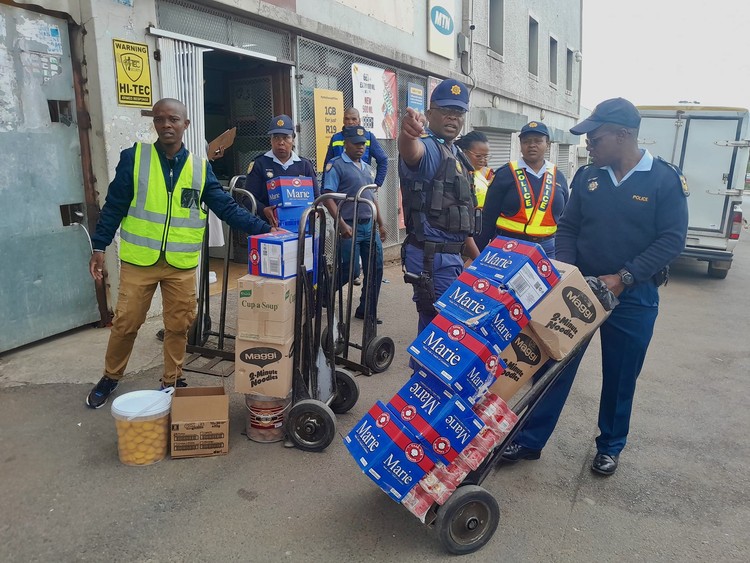Makana’s immigrant-owned spaza shops remain closed
Makana authorities shut the shops two weeks ago citing violations of various regulations
Police and Makana Municipality officials in Makhanda closed down shops found to be selling expired food. Photo: Loyiso Dyongman.
Well ahead of the 13 December deadline to register shops set by the President last month, Makana Municipality shut down 12 out of 20 spaza shops it inspected in central Makhanda on 26 November. The Makhanda spaza shop owners have not yet managed to comply or reopen their shops. Two cash loan businesses were also shut for compliance failures.
Lack of required documentation, improper product labelling, and selling expired food were the main violations. Inspectors confiscated bakkie-loads of expired food.
The operation was led by Mayor Yandiswa Vara and two councillors, and included police, traffic and fire officers, health and building inspectors, and officials from town planning and Home Affairs among other departments.
Municipal spokesperson Anele Mjekula said, “The exercise was part of an effort to get owners to understand what’s expected of them to run their businesses legally.”
The operation has hit immigrant business owners hard. Osama Iqbal, one of the affected spaza owners, said, “I have nothing now. I don’t even have money to buy new stock.”
Adam Chidothi, who together with Sufan Mohamed had a spaza shop in Extension 10 which was also shut down, said, “We are very hurt and it’s not going to be easy to start up again.”
To reopen, spaza shop owners must obtain a business license, submit certified documentation, pay a R525 application fee, and ensure full compliance with municipal bylaws. (Read government’s guide to register shops here.)
Customers had mixed reactions to the operation. Nowakhe Dwani said people have been buying expired food, but they were not getting sick from it.
Babalwa Nonyathi complained that whereas the spaza shops would slice up polony or sell tea bags separately customers would now be forced to purchase only fully packaged goods.
“Sometimes you don’t have cash to buy the full packet,” she said.
Mjekula said inspections will continue until all businesses meet the required standards. He said fines and contravention notices will be served for building, fire and town planning issues.
GroundUp experimented with Claude 3.5 Sonnet in the editing of this article.
Support independent journalism
Donate using Payfast

Don't miss out on the latest news
We respect your privacy, and promise we won't spam you.
Next: “Pot” Stemmet faces charges over theft of Lottery-funded equipment
Previous: Gauteng government’s buried corruption investigation (part one)
© 2024 GroundUp. This article is licensed under a Creative Commons Attribution-NoDerivatives 4.0 International License.
You may republish this article, so long as you credit the authors and GroundUp, and do not change the text. Please include a link back to the original article.
We put an invisible pixel in the article so that we can count traffic to republishers. All analytics tools are solely on our servers. We do not give our logs to any third party. Logs are deleted after two weeks. We do not use any IP address identifying information except to count regional traffic. We are solely interested in counting hits, not tracking users. If you republish, please do not delete the invisible pixel.

